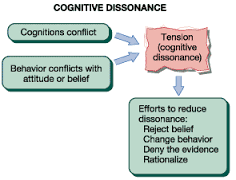AP Psychology Social Psychology – Flashcards
Unlock all answers in this set
Unlock answersquestion
Altruistic Behavior
answer
helping behavior that is not linked to personal gain; recognition and reward are not expected
question
Attitude
answer
relatively stable organization of beliefs, feelings, and behavior tendencies directed toward something or someone—the attitude object; can include facts, opinions, and general knowledge about the object
question
Attribution Theory
answer
theory that addresses the question of how people make judgments about the causes of behavior; theorist Heider argued that a given behavior is attributed to either internal or external causes, but not both
question
Authoritarian Personality
answer
source of prejudice; bigoted personality or persons who are rigidly conventional, tradition abiding, and exhibit hostility towards those who defy norms
question
Bystander Effect
answer
situational variable; as the number of passive bystanders increases, the likelihood that any one of them will help someone in trouble decreases; used to explain the death of Kitty Genovese
question
Cognitive Dissonance

answer
perceived inconsistency between two thoughts; when a person has 2 contradictory or opposite thoughts at the same time;
question
Cognitive Misers
answer
Susan Fiske and Shelley Taylor; idea that human thinkers are stingy with our mental efforts; Example: we keep our first impressions of despite evidence to the contrary
question
Compliance
answer
change of behavior in response to an explicit request from another person or group; techniques to ensure include foot-in-the-door effect, lowball procedure, door-in-the-face effect
question
Foot-in-the-Door Effect

answer
technique to ensure conformity; strategy that states once a person grants a small request, they are more likely to comply with a larger one; Example: once a sales pitch begins the odds of the sale increase because the individual is listening to the request
question
Lowball Procedure

answer
technique to ensure conformity; strategy to induce a person to agree to something by enticing the individual with a low 'cost' and then add-on to the original product; Example: buy a car with no options, but when you add-on the options you have paid more money
question
Door-in-the-Face Effect
answer
technique to ensure conformity; strategy where the individual feels guilty because the first request was refused and therefore, agrees to the second request; Example: Mom can I have a thousand dollars? No, then can I have $20?
question
Conformity
answer
voluntarily yielding to social norms, even at the expense of one's own preferences; necessary for social groups to function effectively; studies by Solomon Asch
question
Contingency Theory
answer
Fiedler; personal characteristics are important to the success of a leader: task-oriented, relationship-oriented
question
Cultural Norm
answer
shared idea or expectation on how to behave; strengthened by habit; folkways-social norms that are acceptable by society (covering mouth when you cough), mores-norms taught by family and community with a religious or moral basis (obey your mother and father, do not kill), and laws-enforced by government (speeding, murder)
question
Cultural Truism
answer
belief that most members of society accept as true; "normal" or "right ways" to behave; typically learned through modeling, imitation, and conditioning; Example: norms, folkways, mores, and laws
question
Culture
answer
tangible goods and the values, attitudes, behaviors, and beliefs that are passed from one generation to another
question
Defensive Attribution
answer
tendency to attribute our successes to our own efforts or qualities and our failures to external factors; motivation to present ourselves well; Example: self-serving bias or just-world hypothesis
question
Deindividuation
answer
loss of personal sense of reasonability of a group; the more anonymous a person feels in a group, the less responsible s/he feels as an individual; used to explain mob behavior; can be influenced by the snowball effect
question
Discrimination
answer
a behavior; an act or series of acts that denies opportunities and social esteem to an entire group of people or individual members of a group; to treat a group as less than equal
question
Exchange
answer
factor that shows how closely linked people are; concept that relationships are based on trading rewards with another person; part of the reward theory of attraction
question
Frustration-Aggression Theory
answer
a source of prejudice; result of the frustrations experienced by the prejudiced group; people who exploited and oppressed often cannot vent their anger against an identifiable or proper target so they displace their hostility onto persons lower on the social scale than themselves
question
Fundamental Attribution Error
answer
tendency to attribute the behavior of others to causes within themselves; overemphasizes personal causes for other people's behaviors and to underemphasize personal causes for their own behavior; part of the actor-observer effect
question
Great Person Theory
answer
are leaders extraordinary people who assume positions of influence and then shape the events around them or do the event produce great leaders?
question
Hawthorne Effect
answer
principle that people will alter their behavior because of researchers' attention and not necessarily because of manipulations of the setting; study of the relationship between productivity and working conditions at an electric plant, productivity increased because of the researchers presence and not because of the change in lighting effects
question
Industrial/Organization Psychology
answer
field that is concerned with the application of principles to the problems of human organizations, especially at work
question
In-group bias
answer
members see themselves not just as different but also as superior to members of out-groups
question
Intimacy

answer
factor that shows how closely linked people are; the quality of genuine closeness and trust achieved in communication with another person; part of the reward theory of attraction
question
Just-World Hypothesis
answer
an attribution error; based on the assumption that bad things happen to bad people and good things happen to good people; jumping to conclusions than give full weight to the situational factors that may have been responsible
question
Obedience
answer
compliance with a demand, especially when it comes from an authority figure; Study by Milgram-shock experiment
question
Polarization
answer
phenomena where individuals become more extreme in their attitudes as a result of group discussion; Example: jury
question
Prejudice
answer
an attitude; intolerant, unfavorable, and rigid view of a group of people; assumption that all members of a group share certain negative qualities; unable to see members of a group as individuals; ignore information that disproves beliefs; theories such as frustration-aggression theory and racism often account for prejudice; expression of suspicious, mistrusting approach to life
question
Primacy Effect
answer
Theory that early information about someone weighs more heavily than later information in influencing one's impression of that person;
question
Proximity
answer
factor that shows how closely linked people are; how close two people live to each other
question
Racism
answer
belief that members of certain racial or ethnic groups are innately inferior; belief that intelligence, industry, morality, and other valued traits are biologically determined and therefore cannot be change; when prejudice and discrimination are directed at a particular racial or ethnic group
question
Risky Shift
answer
phenomenon where a group will take larger risks than if an individual was making the decision
question
Schema
answer
(plural: schemata) a set of beliefs or expectations about something based on past experience; mental representation of an event, object, situation, person, process, or relationship stored in memory that leads one to expect an experience to be a certain way; Example: if you are in a room with a chalkboard and desks, schema leads you to believe that you are in a classroom of a school
question
Self-fulfilling Prophecy
answer
process in which a person's expectation about another elicits behavior from the second person that confirms the expectation; evidenced in a study by Rosenthal and Jacobsen at an elementary school where students performed to the teacher's expectation, AKA Pygmalion Effect
question
Self-Monitoring
answer
part of attitude; tendency for an individual to observe the situation for cues about how to react; do you match your actions to your attitude or do you override your attitude in order to behave properly in a given situation; high self-monitors look at the situation for cues on how to react whereas low self-monitors express and act their attitudes with consistency regardless to situational cues
question
Similarity
answer
factor that shows how closely linked people are; complementary traits of attitudes, interests, values, backgrounds, and beliefs; part of the reward theory of attraction
question
Social Influence
answer
process by which others (individually or collectively) affect our perceptions, attitudes, and actions; includes cultural influence, cultural assimilators, conformity, compliance, and obedience
question
Social Loafing
answer
phenomena where people exert less effort when working in groups than they would if working individually because they assume that other group members will do the work
question
Social Psychology
answer
Scientific study of the ways in which the thoughts, feelings, and behaviors of one individual are influenced by the real, imagined, or inferred behavior or characteristics of other people;
question
Stereotype
answer
A set of characteristics believed to be shared by all members of that social category; stereotype is a special type of schema; inference based on social category and ignores facts about the individual's traits



